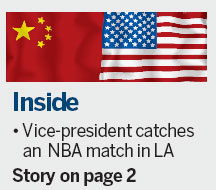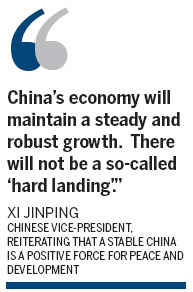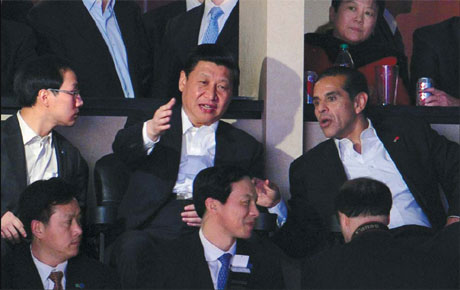Xi to US: Ease up on trade blocks
Updated: 2012-02-19 08:32
By Wu Jiao and Chen Weihua (China Daily)
|
||||||||
|
|
Vice-President urges United States to do its part in advancing economic and trade ties with China
LOS ANGELES / NEW YORK - Visiting Chinese Vice-President Xi Jinping urged the United States to remove trade barriers to further advance economic and trade ties between the two countries.
"The most effective way to reverse the China-US trade imbalance is not to restrict China's exports to the US but rather to expand US exports to China," Xi told the US-China Economic and Trade Cooperation Forum held on Friday morning in Los Angeles, the last stop of his five-day trip.
He was more specifically calling for the US to ease its restrictions on high-tech exports to China, a call he made repeatedly during the visit.
"The restrictions have caused many competent US companies to lose the potential opportunities in the Chinese market," Xi said.
Between 2001 to 2011, China's high-tech imports expanded from $56 billion to $463 billion, with a yearly increase of 23.5 percent on average. Yet in the same period, the share of US high-tech products in China's total high-tech imports plunged from 16.7 percent to 6.3 percent.
"If in 2011, the share of US products in China's total high-tech imports had been kept at the 2001 level, then the US exports to China would have increased by as much as $50 billion," Xi said.
"It is clear that relaxing export control on China is highly beneficial to the US," he said.

Xi said that a prosperous and stable China will not be a threat to any country and it would only be a positive force for peace and development.
Xi described the year 2012 as a crucial year for the implementation of the 12th Five-Year Plan (2011-15).
"China's economy will maintain a steady and robust growth. There will not be a so-called 'hard landing'," he said.
Xi also noted that during the 12th Five-Year Plan, China will expand domestic consumption, import, outward investment and innovation, while the US government is promoting its National Export Initiative and vigorously attracting foreign investment.
"These mutually complementary macroeconomic policy goals offer new, important opportunities for China and the US to deepen economic cooperation and trade," he said.
By 2015, China's total social retail sales are expected to reach 32 trillion yuan ($5 trillion), its domestic market will become one of the largest in the world, its total imports are expected to hit $8 trillion, and its total outbound investment will surpass $500 billion, according to Xi.
"This will create enormous business opportunities for countries around the world. We hope that the US will seize the opportunities to increase the export of competitive civilian high-tech products to China," he said.
Although the US relaxed barriers on some of its high-tech exports to China in 2007, many of the past restrictions still remain in place.
Chinese Ambassador to the US Zhang Yesui told a business gathering two months ago that China would have a $600 billion market for civil aviation, integrated circuits, machine tools and other products by 2020. But most of these products fell under the US export control regime.
Li Zhijun, a researcher at the State Council Development and Research Center, told China Economic Times this week that exports by China and the US are complementary and mutually beneficial. If the US eases or lifts its discriminatory export control, American companies will take a bigger slice of the Chinese market.
Derek Scissors, a research fellow at the Heritage Foundation, said he did not agree with the idea that American restrictions on technology exports cause the trade imbalance.
"The major causes of imbalances are US deficit spending causing excess demand and Chinese overinvestment causing excess supply," he said.
During his speech at the Friday forum, Xi also hailed trade cooperation as the biggest highlight of US-China relations, citing figures that the US agricultural exports to China hitting $23.3 billion in 2011, averaging $4,000 in exports for every American farmer.
Investment ties have been heightened as well, with the scale of bilateral investment approaching $170 billion. There are currently more than 60,000 investment projects in China from the US, which generated sales revenue of $223.2 billion in 2010.

According to a survey conducted by the American Chamber of Commerce in China, some 85 percent of the US companies in China saw increased profits in 2010, and 41 percent of the companies said the profit margin in China is bigger than the global average.
Xi said that it is the responsibility of both the Chinese and US governments to maintain sustainable, steady and healthy trade relations, which are anticipated by companies in both countries.
US Commerce Secretary John Bryson, who also attended the forum, encouraged more Chinese investment, saying that "America is truly open for business".
California Governor Jerry Brown and Los Angeles Mayor Antonio Villaraigosa also lauded the US-China relationship.
"We've got a great future together," said Brown, who announced plans to open a new trade and investment office in China.
After the forum on Friday, scores of American and Chinese businesses signed deals.
The project that drew the most attention was the venture between DreamWorks Animation SKG Inc and China Media Capital and two other groups to create Oriental DreamWorks studio in Shanghai.
Wang Chao contributed to this report.
China Daily

 Relief reaches isolated village
Relief reaches isolated village
 Rainfall poses new threats to quake-hit region
Rainfall poses new threats to quake-hit region
 Funerals begin for Boston bombing victims
Funerals begin for Boston bombing victims
 Quake takeaway from China's Air Force
Quake takeaway from China's Air Force
 Obama celebrates young inventors at science fair
Obama celebrates young inventors at science fair
 Earth Day marked around the world
Earth Day marked around the world
 Volunteer team helping students find sense of normalcy
Volunteer team helping students find sense of normalcy
 Ethnic groups quick to join rescue efforts
Ethnic groups quick to join rescue efforts
Most Viewed
Editor's Picks

|

|

|

|

|

|
Today's Top News
Health new priority for quake zone
Xi meets US top military officer
Japan's boats driven out of Diaoyu
China mulls online shopping legislation
Bird flu death toll rises to 22
Putin appoints new ambassador to China
Japanese ships blocked from Diaoyu Islands
Inspired by Guan, more Chinese pick up golf
US Weekly

|

|







